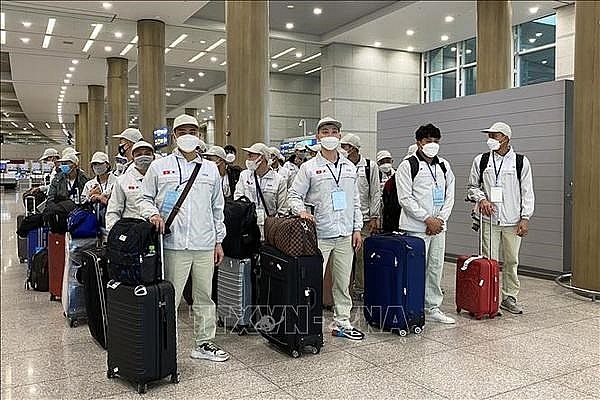German tie-ups increase in labour training and export
Nguyen Cuong from Hanoi is currently studying at Hoga Hotel, a vocational school specialising in hospitality training in Villingen-Schwenningen in southern Germany. Three years ago, Cuong decided to quit studying at a university in Vietnam to go to Germany as a trainee. He currently works at a local hotel in Villingen with a salary of around $900 per month.
Cuong said that he intended to return to his home country to work after completing the 4-year trainee programme. With the degree and work experience accumulated in Germany, he said he would be confident to find a good job in Vietnam.
“Many Vietnamese trainees have joined the same batch as me and also found good study and job opportunities. I feel lucky about this choice,” said Cuong.
 |
| Illustrative image (Source: VNA) |
Along with a good diplomatic relationship with Vietnam for nearly half a century, Germany is one of the closest partners in vocational education and training, especially in industries such as tourism-hotel management, electronics, renewable energy, and IT. There are currently nearly 170 scientific research cooperation projects between German and Vietnamese universities aimed at promoting the exchange of both knowledge and technology between the two sides, according to data from the Ministry of Education and Training.
During a meeting earlier this year with Dr. Philipp Rösler, who became Vietnam’s honorary consul to Switzerland, Minister of Education and Training Nguyen Kim Son said that the demand for highly qualified human resources in Vietnam will increase.
“Vietnamese students need to enhance their practical working ability, career skills, and understanding of technology. Vietnam wants to learn more about the dual vocational education model – a model that combines learning and practice, which is being successfully implemented by Germany,” said Son.
He also hoped that Rösler would support the establishment of joint research groups between professors and experts from Vietnamese, German, and other European universities to promote scientific progress.
In order to further promote cooperation in vocational training, many schools and training institutions in Vietnam have recently cooperated with Germany’s states and vocational schools to train professionals with in-depth knowledge of some of the occupations that are in high demand.
At Vietnamese-German University in the southern province of Binh Duong, all courses are conducted in cooperation with German partner universities with similar requirements. Graduates receive a German bachelor’s or master’s degree and have good job prospects in the international job market. According to statistics by the university, the percentage of students who have a job after three months of graduation reaches 96 per cent, the highest in Vietnam.
Hessen, one of the states with years of cooperation with Vietnam, has provided scholarships at undergraduate, master, and doctoral levels in IT, electrical engineering, mechatronics, energy reproduction, printing and communication technology, and education management and quality, among others for disadvantaged Vietnamese students at state universities.
At the end of August, a representative of the German city-state of Bremen also came to Vietnam to discuss opportunities for cooperation in training workers in Bremen in the fields of cars and automation, shipping, logistics, and other related areas.
Germany transferred to Vietnam 22 sets of vocational training textbooks related to those professions that it hopes to recruit from Vietnam, according to information from Truong Anh Dung, director general of the General Department of Vocational Education.
“After completing the training programme, students will be awarded a Vietnamese college diploma and a German equivalent according to the German national qualification framework,” Dung asserted.
In addition to receiving support from Germany, Vietnam has also become one of the main sources of labour for Germany in fields such as healthcare. About 17,500 nursing positions were vacant between July 2020 and June 2021 in Germany, according to statistics from the German Nursing Association. Statistics also showed that the labour market demand for nurses in Germany is currently at about 60,000 people.
Meanwhile, Vietnam has only brought about 1,600 workers to Germany to study and work in the nursing field since 2012, according to data provided by the Ministry of Labour, Invalids and Social Affairs of Vietnam.
Le Duc Thien, deputy head of the Training Department of the Dong A Institute of Economics and Technology in Ho Chi Minh City – which implements cooperation programmes in education and training between Vietnam and Germany – said that the road to Germany has never been as favourable as it is today because the country is always willing to create conditions for nurses to work long-term, and at the same time encourages settlement to develop careers.
“The gross salary that Vietnamese nurses can receive in Germany is about VND70-90 million ($3,000-3,900) per month, not to mention additional incomes. This is considered a strong attraction for nurses to choose Germany for their career path, besides the social security indicators that are among the highest in the world,” said Thien.
 | Connecting continents via close multi-sector cooperation October 3 will mark the 32nd anniversary of Germany’s reunification. Marko Walde, chief representative of the Delegation of German Industry and Commerce in Vietnam (AHK Vietnam), writes about how important the Vietnamese market is to German investors. |
What the stars mean:
★ Poor ★ ★ Promising ★★★ Good ★★★★ Very good ★★★★★ Exceptional
Related Contents
Latest News
More News
- Vietnam, New Zealand seek level-up in ties (February 19, 2026 | 18:06)
- Untapped potential in relations with Indonesia (February 19, 2026 | 17:56)
- German strengths match Vietnamese aspirations (February 19, 2026 | 17:40)
- Kim Long Motor and AOJ Suzhou enter strategic partnership (February 16, 2026 | 13:27)
- Haiphong welcomes long-term Euro investment (February 16, 2026 | 11:31)
- VIFC in Ho Chi Minh City officially launches (February 12, 2026 | 09:00)
- Norfund invests $4 million in Vietnam plastics recycling (February 11, 2026 | 11:51)
- Marico buys 75 per cent of Vietnam skincare startup Skinetiq (February 10, 2026 | 14:44)
- SCIC general director meets with Oman Investment Authority (February 10, 2026 | 14:14)
- G42 and Vietnamese consortium to build national AI infrastructure (February 09, 2026 | 17:32)

 Tag:
Tag:




















 Mobile Version
Mobile Version